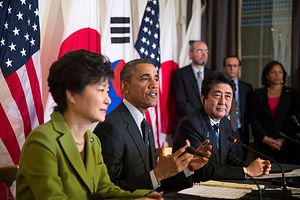Japanese Prime Minister Shinzo Abe arrived in the United States on Sunday, beginning his visit with a stop in Boston. With a major goal of the visit to expand U.S.-Japan defense cooperation (including through the newly revised defense guidelines), China is paying close attention to the visit.
China has natural concerns about a strong alliance between its neighbor to the east and the United States, particularly as both parties aren’t shy about expressing their opposition to Chinese moves in the region (especially its attempts to shore up its claims to sovereignty over islands in the East and South China Seas). Interestingly, however, China often doesn’t frame its objections through the lens of present-day security concerns, opting instead to mount an attack on Abe’s attitude toward history. In the Chinese line of argument, Abe’s refusal to fully apologize or face up to atrocities committed during World War II makes the prospect of a stronger Japanese military today a threat to global peace.
As Hong Lei, a spokeperson for China’s Foreign Ministry, put it in a recent press conference:
[T]he statements made and messages sent by the Japanese leader to the outside world on the history issue not only affect the process of reconciliation between Japan and its Asian neighbors, but also help the international community detect whether Japan sticks to the path of peaceful development.
In other words, Japan’s treatment of the past is seen as future-oriented, a way of predicting what Tokyo’s intentions are.
Such arguments have been rolled out frequently since Abe visited the Yasukuni Shrine in December 2013. In China, Abe’s cavalier attitude toward history has become linked to moves to revise the way Japan’s pacifist constitution is interpreted. Xinhua reframed this point with a specific eye toward Abe’s visit to the United States this week, arguing that Abe’s historical revisionism is “a slap in the face of Washington.”
The piece urges Abe to avoid “rightist, nationalist, and revisionist impulses” in favor of “more prudent and thus wiser statements.” However, Xinhua assumes that Abe won’t heed this advice – advance reports on the content of his speech before Congress indicate that Abe won’t spend much time talking about history. If his speech in Indonesia is any indication, as Yuki Tatsumi argued in a recent Diplomat piece, Abe will make a brief mention of “remorse” before moving on to a discussion of “Abe’s own vision for Japan’s future role in the world.”
If Abe, as expected, fails to precisely repeat the apologies of his predecessors during his congressional address, Xinhua says, it will reflect poorly on the United States. As evidence, a separate Xinhua piece highlights statements from activists and politicians in China, South Korea, and the United States, all urging Abe to address historical issues. As the Associated Press made clear in a recent article interviewing U.S. veterans and formed Japanese prisoners of war, even in the United States there are strong opinions about Japan’s approach to wartime history.
“U.S. President Barack Obama should also be vigilant not to be lured by and hijacked by those rightist statements of the strident Japanese leader during the visit,” Xinhua warned.
Xinhua also labeled Japan a “a capricious and provocative ally” and “a troublemaker which has … embroiled the U.S. in its squabbles with irritated neighbors over historical feuds and territory brawls.” Xinhua argues that getting too close to Abe and Japan is against the United States’ best interests – all because of historical tensions that have caused a rift between Japan and its neighbors.

































